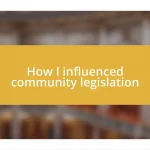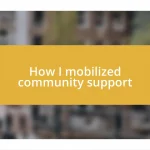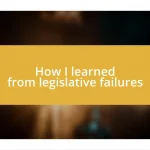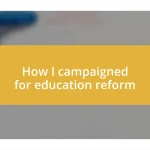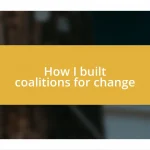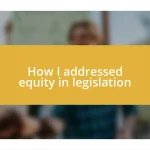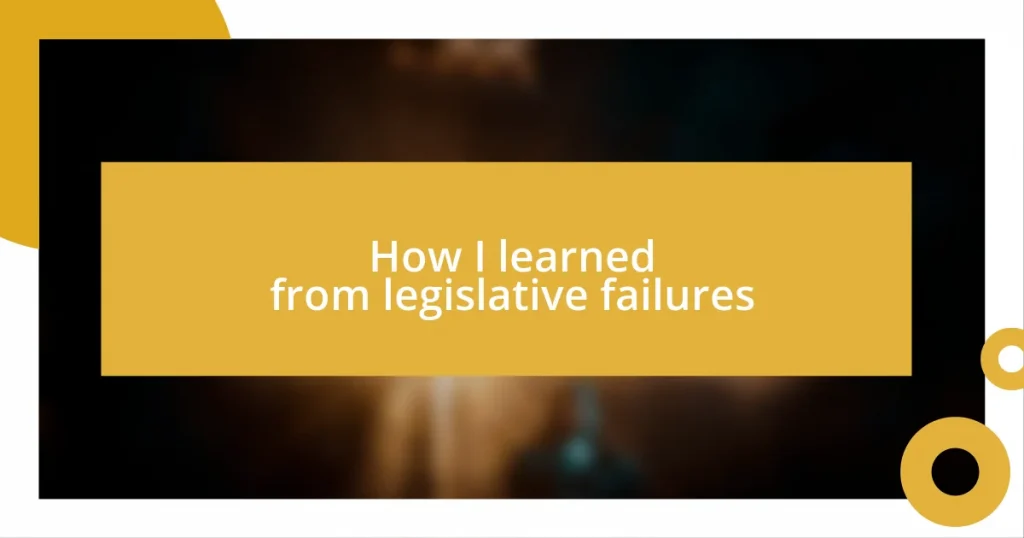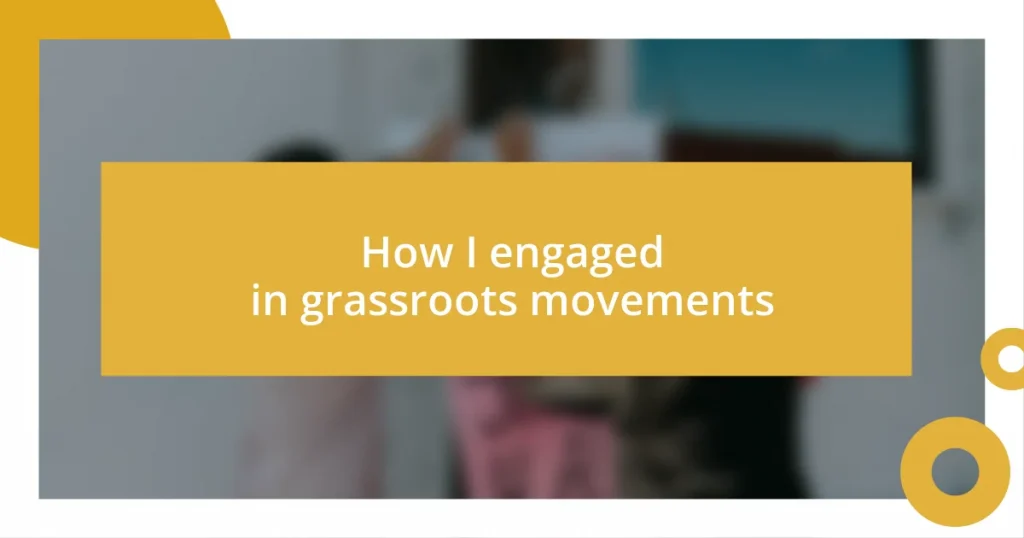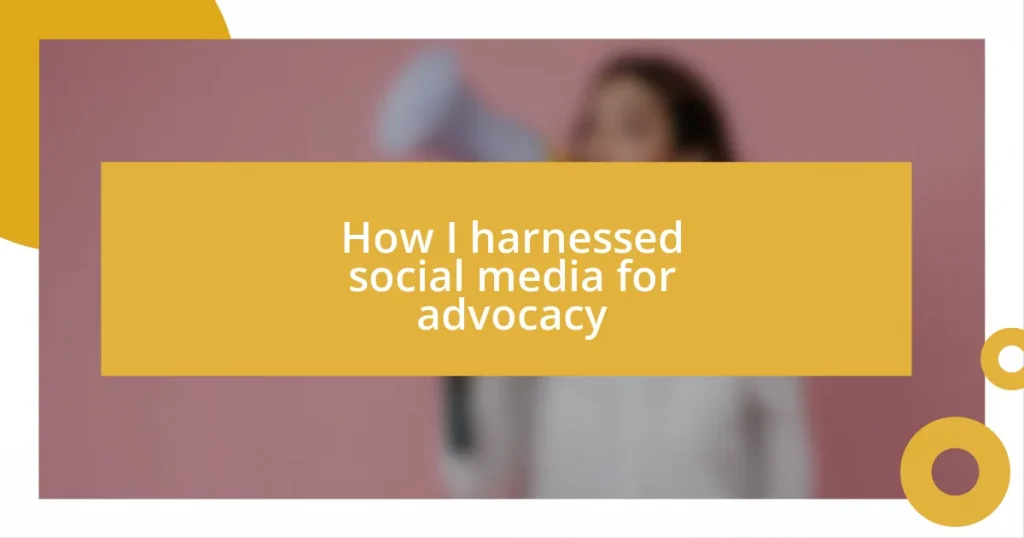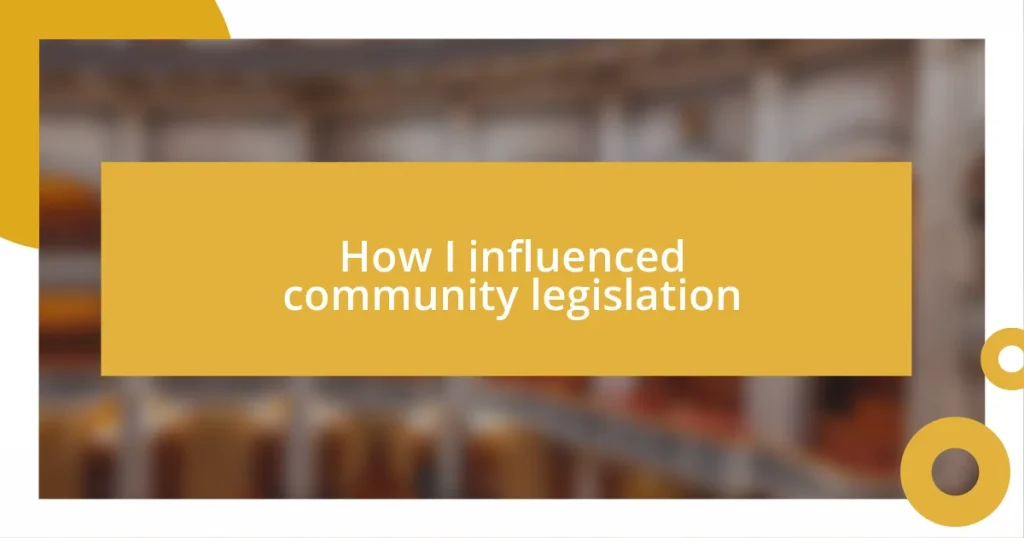Key takeaways:
- Engaging diverse stakeholders early and genuinely helps ensure inclusive policies and reduces resistance.
- Flexibility and adaptability in policymaking allow for collaboration and improved communication, fostering a culture of resilience.
- Continuous learning from past failures through feedback promotes innovation and strengthens legislative efforts.
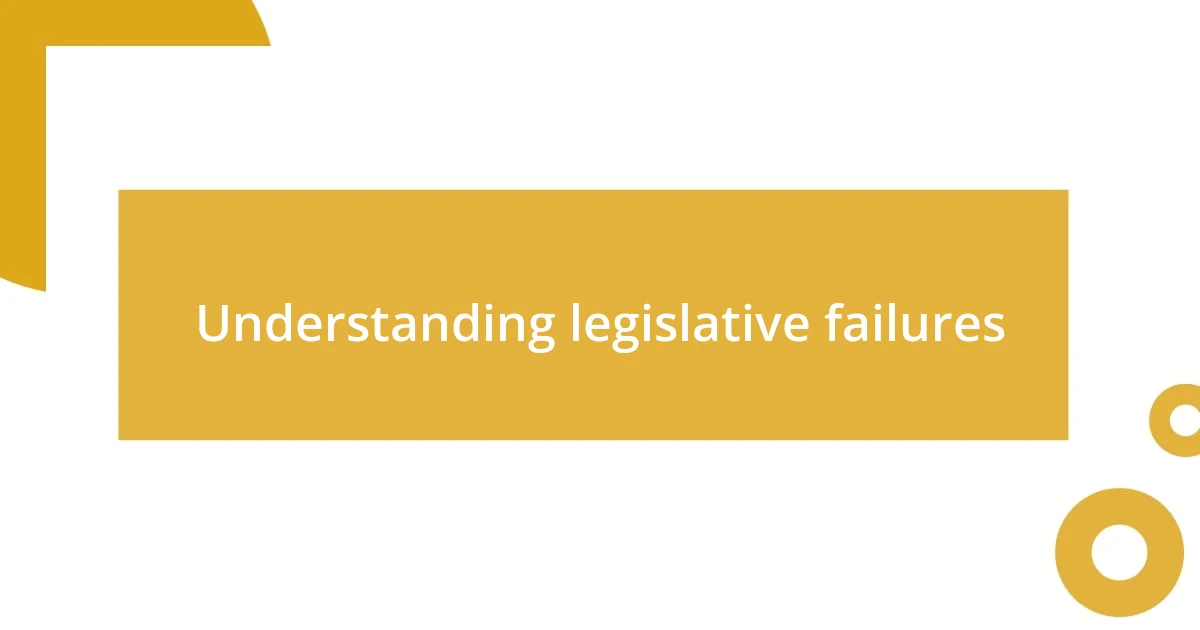
Understanding legislative failures
Legislative failures are often the result of a complex interplay of factors, including poor communication, lack of stakeholder engagement, and insufficient understanding of the issues at hand. I remember when I was working on a local initiative to address community health concerns, and it became evident how vital it was to involve the right voices from the start. If we had ensured diverse perspectives were part of the conversation, could we have avoided the obstacles that later plagued our legislative efforts?
Failure in legislation can often be heart-wrenching. I vividly recall attending a city council meeting where a proposed law to improve public transportation was shot down due to a lack of public support. The disappointment in the room was palpable. It makes me question, how often do our legislators prioritize their agendas over the actual needs and voices of the community?
Understanding legislative failures also means recognizing that these setbacks can be invaluable learning experiences. During a failed attempt to push for environmental regulations, I found myself analyzing what went wrong. I realized that the absence of empirical data to back our claims significantly undermined our position. Reflecting on these moments reshaped my approach, reminding me that each failure holds a lesson, provided we’re willing to listen.
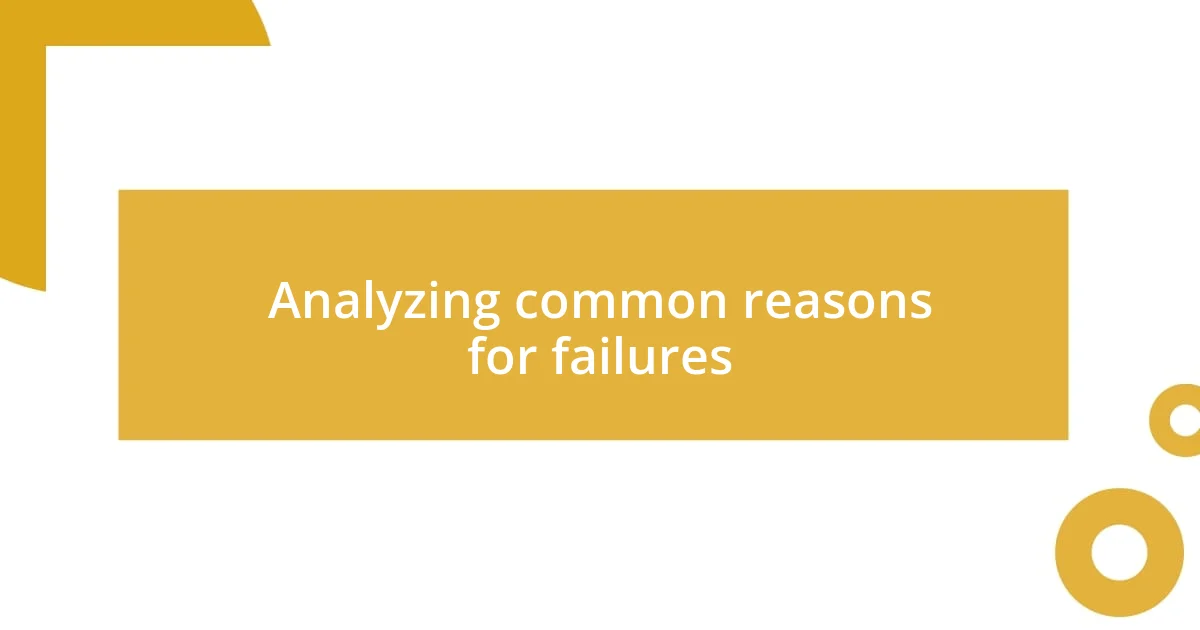
Analyzing common reasons for failures
It’s fascinating to reflect on the very reasons that lead to legislative failures. Oftentimes, a critical element is the inability to articulate clear goals and outcomes. I recall working on a policy proposal where our objectives were vague at best. When stakeholders couldn’t see a tangible vision, support dwindled, forcing us to confront the consequences of our lack of clarity and foresight.
Here are some common reasons for legislative failures:
- Poor communication: Inadequate messaging can create confusion and alienate potential supporters.
- Insufficient stakeholder engagement: Not involving the right individuals early on often leads to resistance down the line.
- Lack of empirical evidence: Proposals grounded in anecdotal evidence rather than robust data can struggle to gain traction.
- Neglecting community needs: Failing to assess the actual issues impacting constituents can result in misplaced priorities in the legislative agenda.
- Political agendas overshadowing public interests: When lawmakers focus more on their ambitions than the community’s needs, it can alienate voters and result in policy rejection.
Each of these points resonates with me and reminds me of critical moments from my own involvement in the legislative process. Missing these pivotal elements often led to moments of frustration, making me realize just how crucial they are in our efforts to enact meaningful change.
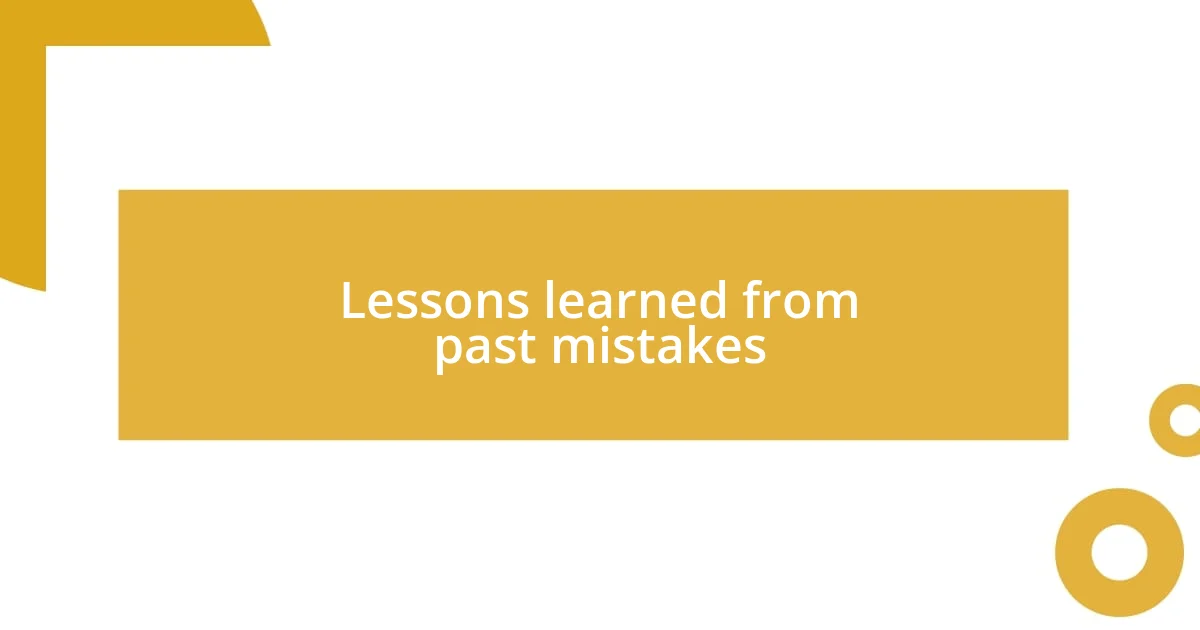
Lessons learned from past mistakes
Reflecting on past mistakes often uncovers golden insights that can guide future efforts. I remember a time when my team launched a campaign centered around education reform without first gathering input from teachers. The resulting backlash was a wake-up call. It showed me that real success comes when you not only understand the issues but also listen to the people most affected by them. Have you ever engaged in a project that overlooked key stakeholders? The humility of realizing our oversight was tough, but it paved the way for a more inclusive approach in future projects.
One of the most profound lessons I learned from legislative failures is the importance of adaptability. Early in my career, I pushed for a healthcare bill that was met with fierce resistance due to its rigidity. It dawned on me that flexibility in approach can enhance collaboration and increase the chances of success. Have you ever encountered resistance in your initiatives? Adaptability transformed our discussions from confrontational to constructive, illustrating the power of compromise and open-mindedness in legislation.
I’ve often observed that a lack of transparency often breeds distrust in legislative processes. During a local zoning debate, there was a palpable sense of skepticism from the community due to unclear motivations. Watching community members pull away from the conversation was disheartening. It became clear that cultivating trust through openness and honesty is crucial. What experiences have you had that highlighted the need for transparency? Each encounter has reinforced the lesson that clear communication can change the hearts and minds of constituents and build a strong foundation for future legislative efforts.
| Legislative Issue | Key Lesson Learned |
|---|---|
| Education Reform Campaign | Involve stakeholders to connect with community needs. |
| Healthcare Bill Resistance | Flexibility fosters collaboration and promotes success. |
| Local Zoning Debate | Transparency builds trust and engagement with constituents. |
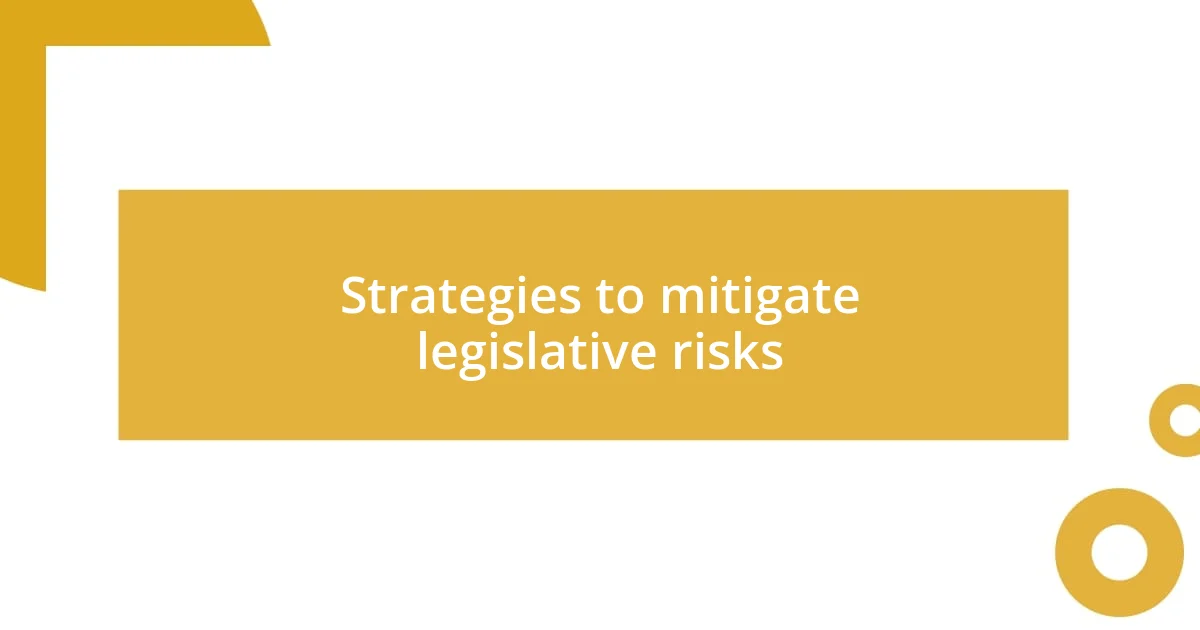
Strategies to mitigate legislative risks
To effectively mitigate legislative risks, it’s essential to engage diverse stakeholder groups from the start. I recall a project focused on environmental regulation where we brought together community members, business leaders, and environmental advocates. This collaborative approach not only enriched our proposal but also fostered a sense of shared ownership among stakeholders. Have you ever witnessed the power of collaboration in action? It can transform potential pushback into proactive support.
Another strategy I’ve found invaluable is utilizing data-driven insights to underpin legislative proposals. In an initiative aimed at housing reform, we gathered extensive data on local housing needs, which later proved vital in discussions with lawmakers. As I learned through this experience, empirical evidence can cut through skepticism. Do you remember a time when data changed the narrative in your projects? It’s incredible how solid numbers can sway opinions and make abstract ideas more tangible.
Finally, I believe it’s crucial to maintain open lines of communication throughout the legislative process. During a transportation bill I was involved with, regular updates and feedback sessions allowed us to address concerns before they escalated. This proactive communication not only kept the project on track but also built a rapport with the community. Have you ever found that transparency shaped the outcomes of a project? The emotional investment of stakeholders increases significantly when they feel informed and involved.
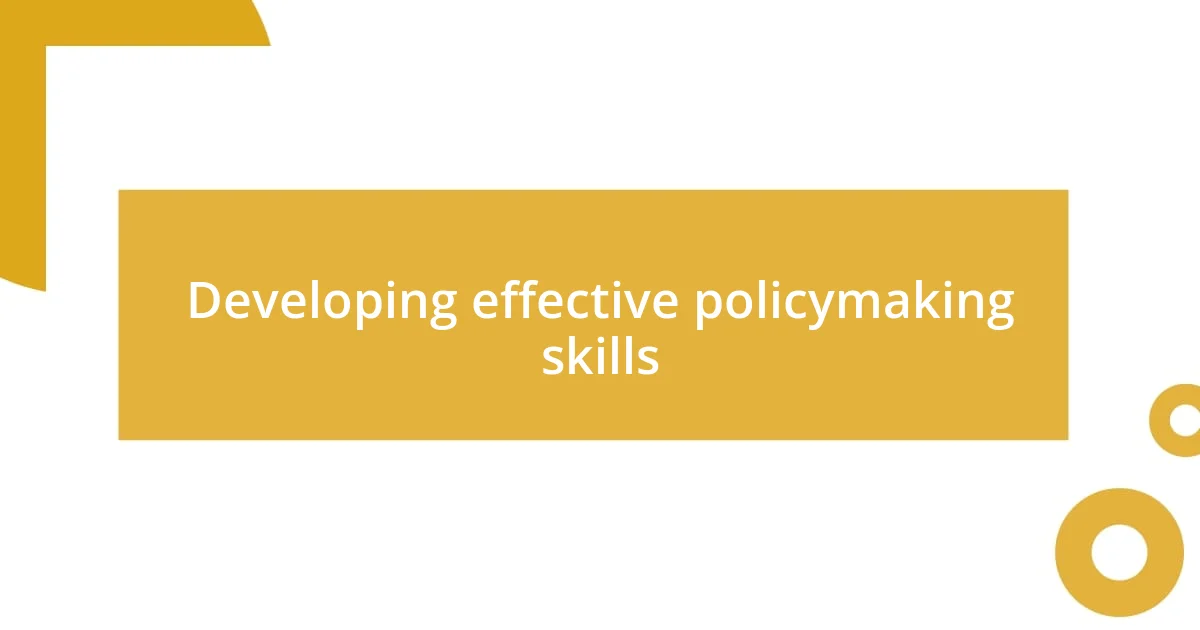
Developing effective policymaking skills
Effective policymaking skills often hinge on the ability to empathize with those affected by decisions. I vividly recall working on a youth engagement initiative where our team thought we understood the needs of young people. Yet, when we finally sat down with them, I was surprised by the nuanced challenges they shared—things we never even considered. This experience reinforced for me that listening and genuinely valuing diverse perspectives are central to crafting policies that resonate.
As I reflect on my journey, one defining moment occurred during a public health project where timelines were tight, and tensions ran high. I learned the hard way that rushing through the process stifles creativity and undermines trust. Unpacking my initial mindset, I realized that allowing time for brainstorming and collaboration often leads to innovative solutions. Have you ever experienced the tension between urgency and thoroughness? Recognizing that a little patience can transform the process felt liberating.
Finally, I can’t overstate the importance of continuous learning in developing effective policymaking skills. After witnessing a particular bill falter due to unforeseen consequences, I committed to regularly seeking feedback and reflecting on outcomes. This habit cultivated a culture of improvement within my team, where we could openly discuss failures and victories alike. Have you found that creating a safe space for feedback enhances your projects? It’s awe-inspiring to see how embracing vulnerability fosters growth and innovation in the pursuit of effective legislation.
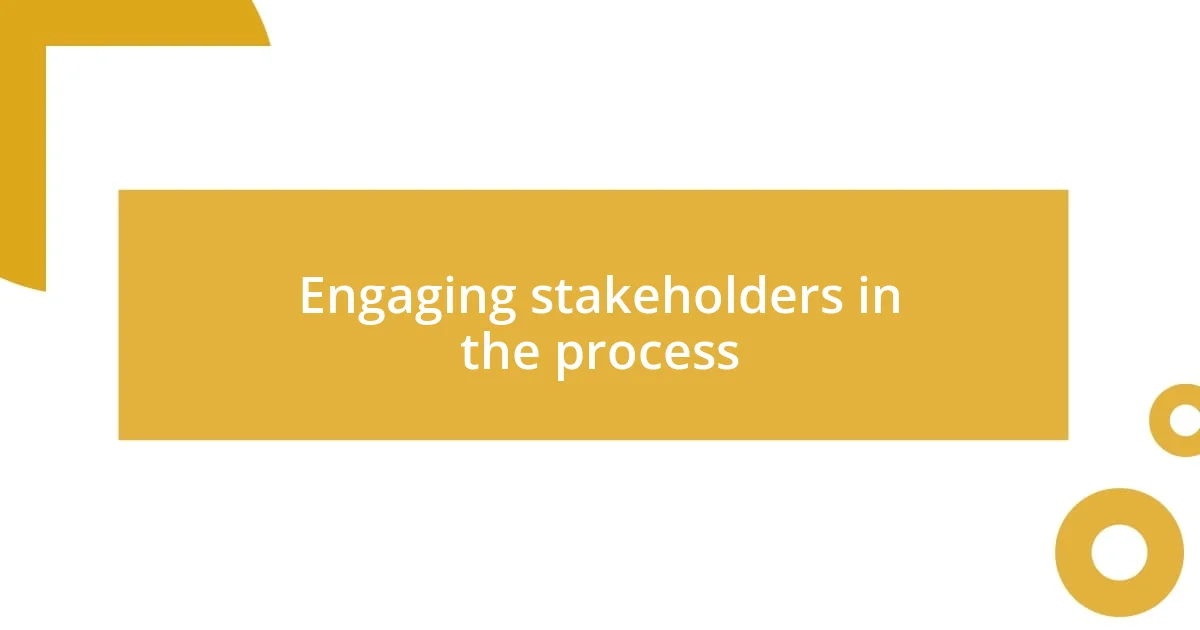
Engaging stakeholders in the process
Engaging stakeholders is not just about bringing people to the table; it’s about ensuring they feel heard and valued. One memorable experience I had was during a community safety initiative. We organized a forum where residents could voice their concerns and suggestions. The raw emotions displayed were transformative. I realized that when stakeholders see their input reflected in the decision-making process, it fosters a bond that can turn skepticism into active involvement. Have you ever noticed how a genuine listening ear can change the tone of an entire project?
In another instance, I coordinated workshops aimed at integrating business owners’ perspectives into urban development plans. Initially, their apprehension was palpable; they felt sidelined in discussions that directly impacted their livelihoods. By creating spaces for their feedback, we not only highlighted their expertise but also gained invaluable insights. This collaboration sparked innovative ideas I hadn’t anticipated. When stakeholders are given ownership, it can lead to outcomes that reflect a true community vision. Doesn’t it feel enriching when all voices are integrated into the narrative?
I’ve also learned that follow-up is key to maintaining engagement. After a major legislative session on educational reform, I reached out to teachers and parents to solicit their thoughts on the progress. The responses I received were a mixture of enthusiasm and critical feedback that helped shape future discussions. This ongoing connection reassured stakeholders that their opinions matter long after the initial conversation has ended. Have you experienced how continued engagement can solidify trust among stakeholders? For me, it became clear that commitment to dialogue transforms relationships into partnerships that drive success.
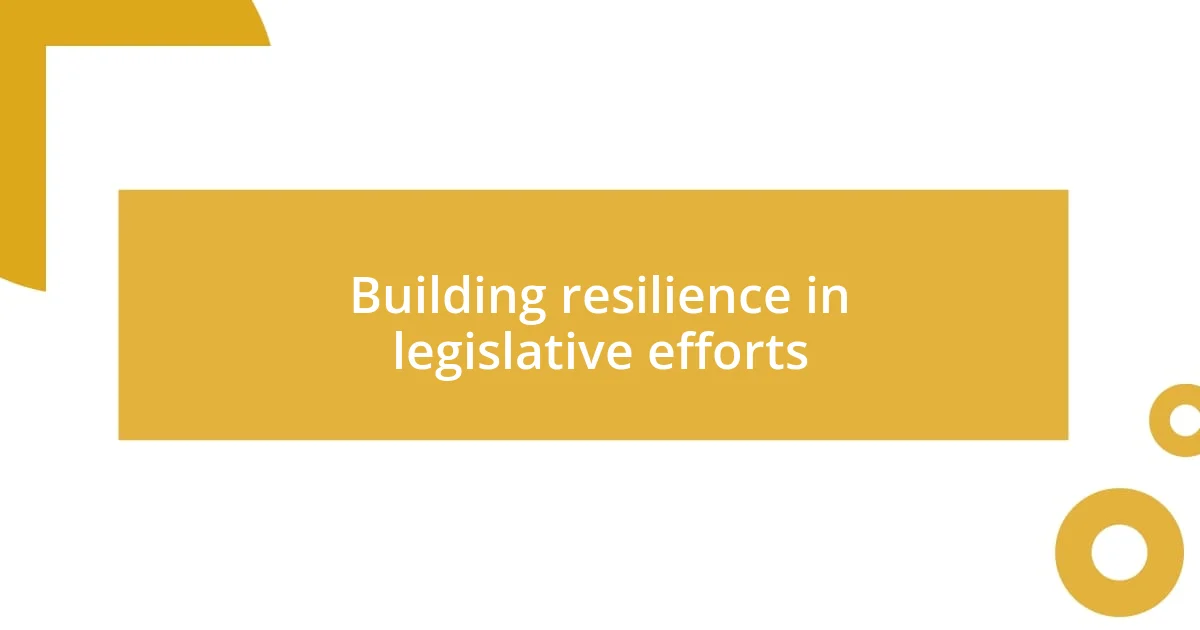
Building resilience in legislative efforts
Building resilience in legislative efforts often means learning to adapt and pivot in the face of setbacks. I remember working on a statewide education reform initiative that seemed promising initially. When it faltered, I used the experience as a stepping stone rather than a stumbling block. It was a moment that taught me the value of resilience; I found myself reanalyzing feedback and willing to experiment with new strategies to engage educators in the process. Have you ever experienced a failure that pushed you to rethink your entire approach?
The emotional climate during these challenging times can be charged, yet it fuels growth. During a legislative effort that faced significant opposition, my team and I decided to hold a series of small, informal gatherings to discuss concerns. These settings turned out to be crucial. I was struck by how sharing vulnerabilities helped build a deeper connection among us. In those moments, I learned that creating a safe space for dialogue—even amidst failure—could foster resilience and camaraderie. Have you discovered how transparency can shift the energy during tough times?
Ultimately, fostering a culture of resilience involves a commitment to iterative learning and adaptation. After a policy proposal that didn’t go as planned, I made it a priority to revisit our processes. It became clear that documenting lessons learned and sharing them within the team created a foundation of knowledge we could build on. Looking back, I realize that it’s this ongoing feedback loop that strengthens our efforts. How have you tackled the challenge of nurturing resilience within your teams? The truth is, by leaning into these experiences, I gained not just insights but a renewed sense of purpose in advocating for change.


